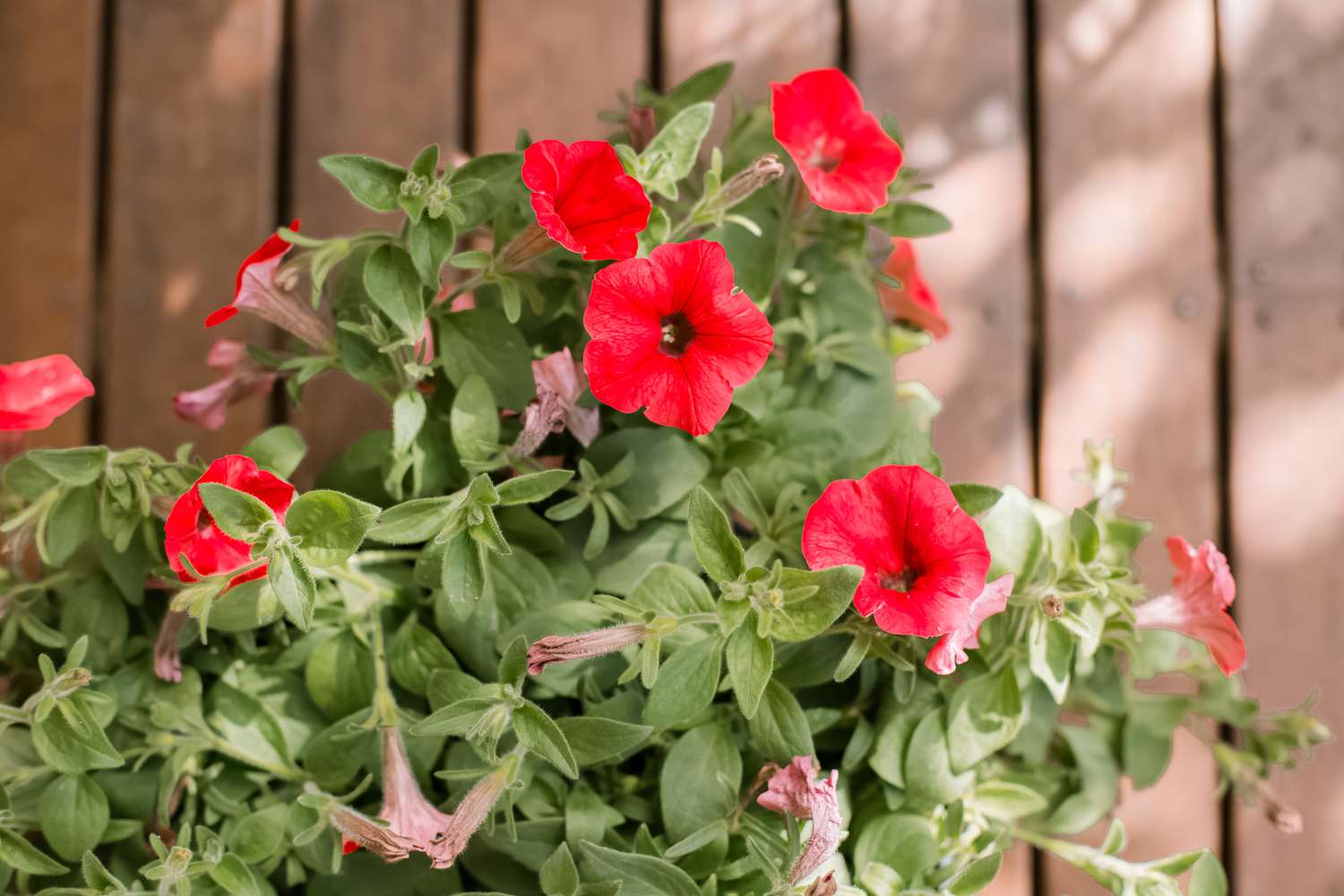
Petunias are vibrant and popular flowering plants that are commonly found in gardens and homes around the world. These beautiful annuals, known for their striking blooms in a variety of colors, have captivated the hearts of many plant enthusiasts. However, there is much more to petunias than meets the eye. In this article, we will delve into 15 extraordinary facts about petunias that will not only expand your knowledge but also deepen your appreciation for these stunning plants. From their fascinating history to their surprising benefits, you’ll discover a whole new world of information about these delightful flowers. So, let’s begin our journey and explore the extraordinary world of petunias!
Key Takeaways:
- Petunias are colorful, low-maintenance flowers that can attract hummingbirds and be used as ground covers, adding beauty and charm to any garden or outdoor space.
- With over 35 species, petunias come in a wide array of colors and are easy to grow, making them a versatile and popular choice for gardeners of all skill levels.
Petunias are native to South America.
Petunias, scientifically known as Petunia x hybrida, originate from South America. They were first discovered in Argentina and were later introduced to other parts of the world due to their stunning beauty.
There are over 35 species of petunias.
The Petunia genus consists of more than 35 different species. Each species comes in various colors, sizes, and growth habits, making petunias a versatile and popular choice among gardeners.
Petunias are part of the nightshade family.
Belonging to the family Solanaceae, petunias are closely related to other flowering plants such as tomatoes, potatoes, and peppers. This family is known for its vibrant blooms and diverse range of species.
Petunias can self-pollinate.
Petunias have the unique ability to undergo self-pollination. This means that they can produce seeds and offspring without the need for external pollinators like bees or butterflies.
Petunias come in a wide array of colors.
From vibrant reds and pinks to soothing blues and purples, petunias offer a stunning palette of colors to choose from. Gardeners can mix and match different shades to create a visually captivating display.
Petunias are annuals, but some varieties can be overwintered.
Most petunias are annual plants, meaning they complete their lifecycle in one growing season. However, some cultivars, like the “Wave” series, have the ability to survive mild winters and bloom again the following year.
Petunias are excellent container plants.
Due to their compact size and beautiful blooms, petunias thrive when grown in containers. They are commonly used in hanging baskets, window boxes, and patio planters to add a burst of color to any space.
Petunias are heat-tolerant flowers.
These resilient flowers can withstand high temperatures and thrive in sunny locations. They are well-suited for summer gardens and can continue to bloom even in hot and humid climates.
Petunias have a mild, sweet fragrance.
Many petunia varieties emit a delicate, sweet scent that adds an extra sensory experience to your garden. This aroma can attract pollinators like bees and butterflies, enhancing the overall biodiversity of your outdoor space.
Petunias are easy to grow from seeds or transplants.
Whether you prefer to start from seeds or purchase transplants, petunias are relatively easy to grow. With proper care and maintenance, you can enjoy a stunning display of these beautiful flowers throughout the summer.
Petunias can be grown in both sun and partial shade.
While petunias thrive in full sun, some varieties can tolerate partial shade as well. This flexibility allows gardeners with different sunlight conditions to enjoy the beauty of petunias in their landscapes.
Petunias are widely used in bedding displays.
Thanks to their vibrant colors and compact growth habit, petunias are a popular choice for creating eye-catching bedding displays. They can be planted en masse to create a striking carpet of blooms in gardens and parks.
Petunias are low-maintenance plants.
Once established, petunias require minimal care. Regular watering, occasional fertilizing, and deadheading spent blooms are typically the main tasks involved in maintaining healthy and thriving petunia plants.
Petunias can attract hummingbirds.
The bright and colorful blossoms of petunias can attract hummingbirds, adding a touch of life and movement to your garden. Their tubular flowers provide a convenient nectar source for these delightful and fast-flying birds.
Petunias can be used as ground covers.
Some trailing petunia varieties, such as the Surfinia series, are excellent choices for ground covers. They spread quickly, creating a lush carpet of blooms that adds beauty and suppresses weed growth.
In conclusion, these 15 extraordinary facts about petunias highlight their beauty, versatility, and ease of cultivation. Whether used in hanging baskets, containers, or garden beds, petunias are sure to bring vibrant colors and a touch of charm to any outdoor space.
Conclusion
In conclusion, petunias are extraordinary plants that offer a wide range of interesting facts. From their vibrant colors to their adaptability in different environments, petunias have captured the hearts of gardeners worldwide. As we have explored various aspects of these beautiful flowers, including their origin, habits, and uses, it becomes clear why petunias are a popular choice for both beginners and seasoned gardeners alike.Whether you are looking to add a pop of color to your garden, attract pollinators, or simply enjoy the enchanting fragrance, petunias offer endless possibilities. With their diverse range of varieties, from cascading to upright, single to double blooms, there is a petunia for every taste and preference. So, next time you stroll through a garden or visit a flower shop, take a moment to appreciate the extraordinary beauty and versatility of the petunia.
FAQs
1. How long do petunias bloom?
Petunias typically bloom from late spring to early fall, providing consistent color throughout the growing season.
2. Do petunias require a lot of sun?
Yes, petunias thrive in full sun and require at least six hours of direct sunlight each day to flourish and produce vibrant blooms.
3. Can petunias be grown in pots or containers?
Absolutely! Petunias are well-suited for container gardening and can thrive in pots or hanging baskets, adding a burst of color to balconies and patios.
4. How often should petunias be watered?
Petunias prefer consistently moist soil, so it’s important to water them regularly. Aim to keep the soil evenly moist, but avoid overwatering, as it can lead to root rot.
5. Can petunias tolerate cold temperatures?
While some varieties of petunias can withstand mild frost, most are sensitive to cold temperatures. It’s best to plant petunias after the danger of frost has passed.
6. Are petunias low-maintenance plants?
Yes, petunias are relatively low-maintenance plants. Regular deadheading, removing faded flowers, will encourage continuous blooming, and occasional fertilizing will ensure healthy growth.
7. Can petunias attract pollinators?
Yes, petunias are known to attract butterflies, bees, and hummingbirds, making them a valuable addition to any pollinator-friendly garden.
8. Can petunias be grown from seeds?
Absolutely! Petunias can be grown from seeds, but they require specific germination conditions, such as light exposure and optimal soil temperature.
9. Can petunias be grown indoors?
While petunias prefer outdoor growing conditions, certain varieties can be grown indoors as long as they receive sufficient sunlight and proper care.
10. Can petunias be propagated?
Yes, petunias can be propagated through cuttings. By taking stem cuttings and rooting them in moist soil, you can create new plants and expand your petunia collection.
Petunias never cease to amaze with their vibrant colors and resilient nature. From their South American origins to their versatility in gardens worldwide, these fascinating flowers have captured hearts and imaginations. If you're curious about specific petunia species or want to explore more captivating facts, we've got you covered. Delve into the enigmatic world of Petunia Integrifolia, uncover even more mind-boggling petunia facts, or take a journey with Fiona Shaw and her incredible story. Get ready to be enchanted by the wonders of petunias and the people who love them.
Was this page helpful?
Our commitment to delivering trustworthy and engaging content is at the heart of what we do. Each fact on our site is contributed by real users like you, bringing a wealth of diverse insights and information. To ensure the highest standards of accuracy and reliability, our dedicated editors meticulously review each submission. This process guarantees that the facts we share are not only fascinating but also credible. Trust in our commitment to quality and authenticity as you explore and learn with us.


